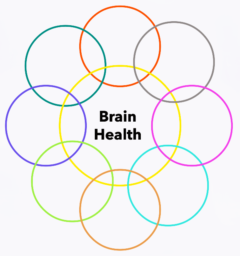
Regular medical check-ups can offer a proactive approach to maintaining cognitive health by identifying and managing risk factors, monitoring cognitive function, and providing tailored advice on lifestyle modifications. The mainstream healthcare system provides a range of clinical services that can contribute to brain health and reduce the risk of Alzheimer’s disease, and it is essential to include brain health concerns in your regular check-ups. It is important to know what services are available and how they can contribute to your brain health. It is also important to be aware of potentially significant gaps and challenges within the traditional mainstream healthcare system that can affect the care you receive.
I am going to approach this from the patient perspective by giving you my thoughts on what to expect during a check-up. I am not a licensed healthcare professional. So, while this content may be informative and supportive, it should not be used for diagnosing, examining, or treating any health issues, nor is it intended to replace the expertise and personalized care of a medical professional. Nor do I claim to determine the effect of any treatment, medication, or recommendation on any medical condition. What follows is only for educational purposes based on my personal research and experience. See the Medical and Health Disclaimer at the bottom of this post.
Traditional Approach: Progression of Alzheimer’s as Inevitable
The current mainstream healthcare system is somewhat divided in its approach to Alzheimer’s disease, with a significant portion of services historically based on the assumption that the progression of dementia is inevitable, irreversible, and usually detectable only in advanced stages. Traditionally, the healthcare system has focused on managing symptoms and providing support for patients with dementia after significant cognitive decline has occurred. This approach often involves palliative medication to manage symptoms, as well as support services for caregivers and end-of-life planning. However, there has been a growing emphasis on early detection and preventive strategies aimed at slowing or even reversing the progression of cognitive decline.
Within the current mainstream healthcare system, Alzheimer’s disease is most commonly diagnosed in people aged 65 and older, though early-onset Alzheimer’s can occur in people as young as their 40s or 50s. The age of diagnosis often depends on when symptoms become noticeable and when medical assessment is sought by the patient or the family. However, changes in the brain that lead to Alzheimer’s disease typically start developing decades before symptoms appear, often beginning in a person’s 40s or 50s, and sometimes even earlier. The biological changes that lead to Alzheimer’s disease include: amyloid plaque accumulation, tau tangle formation, brain inflammation, and cellular dysfunction. The likelihood of slowing or even reversing these changes is greater the earlier they are detected and treated. This long pre-diagnosis phase highlights the importance of early detection and intervention to potentially delay or prevent the onset of Alzheimer’s disease, even before symptoms arise.
As of 2024, approximately 6.9 million Americans aged 65 and older are living with Alzheimer’s disease. This number is projected to reach 12.7 million by 2050. The economic burden is substantial, with the total cost of care expected to reach $360 billion in 2024, and rising significantly as cases increase. This growth in Alzheimer’s cases will strain healthcare resources, increase Medicare and Medicaid spending, and place a significant burden on family caregivers, who provide unpaid care valued at hundreds of billions annually. Given this increasing burden on the economy and families, there is increasing recognition of the importance of early detection of cognitive decline and the adoption of more preventive measures.
What To Expect During Check-Ups and Limitations to Address
The current mainstream healthcare system is in transition. However, this shift is not yet fully realized across the board, and there are still significant gaps in the consistent application of effective approaches. So what can you expect from the current healthcare system during your check-up? Here is an overview of what is typically available from your healthcare provider and what limitations you may encounter.
- Basic Cognitive Screening
-
- What to Expect: Physicians might perform simple cognitive assessments such as the Mini-Mental State Examination (MMSE) or Montreal Cognitive Assessment (MoCA) to evaluate memory, attention, and other cognitive functions. These screenings are usually given to older adults or those with known risk factors.
-
- Limitations: These tests are often brief and may not detect early or subtle cognitive changes. In-depth cognitive testing and neuropsychological evaluations are typically not part of a standard check-up and might only be offered if there are clear signs of cognitive decline or if you explicitly request them. Early and subtle cognitive changes might be overlooked.
- Risk Factor Assessment
- What to Expect: The physician will likely assess and manage risk factors like high blood pressure, diabetes, and high cholesterol, as these are closely linked to brain health.
- Limitations: The connection between these conditions and brain health might not be explicitly discussed, and the focus may be more on managing these conditions in general rather than for dementia prevention purposes. For those with a family history of dementia, genetic counseling and testing for risk factors (like the APOE gene) might not be offered or discussed. This could be important for more personalized prevention strategies.
- Mental Health Evaluation
- What to Expect: Screening for depression, anxiety, and other mental health conditions may be part of the check-up, as these can impact cognitive function.
- Limitations: While mental health screening might occur, comprehensive mental health care or a focus on how mental health impacts brain health might be lacking.
- Lifestyle Counseling
- What to Expect: Physicians may provide general advice on diet, exercise, sleep, and other lifestyle factors that contribute to overall health, including brain health.
- Limitations: This advice is often brief and may not be personalized or emphasized as much as it should be. Follow-up and support for implementing these changes might also be limited. Personalized recommendations for brain health, such as specific dietary plans (e.g., the Mediterranean or MIND diet), cognitive training exercises, or targeted supplements, are often not provided. Patients may receive general advice, but without tailored plans or resources to implement them effectively.
- Vaccinations and Infection Prevention
- What to Expect: Physicians will ensure that the patient is up-to-date on vaccinations, which is important for preventing infections that could affect brain health.
- Limitations: While vaccinations are routinely offered, the direct connection to brain health might not be highlighted.
- Integration with Other Specialists
- What to Expect: Neurologists, geriatricians, and other specialists are available for more advanced care, including when cognitive issues are detected. Memory clinics and specialized dementia care services exist in many areas.
- Limitations: Collaboration with specialists is often not part of routine care unless a specific problem is identified. This could mean missing out on more specialized brain health services early on. Access to specialized care can be limited by long wait times, geographic disparities, and insurance limitations. Many patients may not see a specialist until significant cognitive decline has already occurred, reducing the effectiveness of interventions.
- Education and Awareness
- What to Expect: If the patient mentions concerns about memory or cognitive function, or if issues are identified in a family history of medical screening, the physician might provide information about early signs of dementia though the depth and focus of this information may vary. Some clinics may provide brochures or handouts on brain health, but these are not universally available. There are initiatives to educate both providers and patients about reducing the risk of Alzheimer’s through lifestyle and medical management.
- Limitations: Many healthcare providers may not prioritize brain health discussions during routine visits, often focusing on more immediate physical health concerns. Additionally, patients may not be fully aware of the steps they can take to protect their cognitive health, especially if they are not directly at risk. Patients might not receive detailed information on the latest research or comprehensive strategies for brain health and dementia prevention. Discussions are often general rather than personalized, lacking in-depth exploration of individual risk factors or tailored preventive measures. Ongoing support to implement lifestyle changes for brain health may be limited or absent.
Conclusion: Be The CEO Of Your Brain Health
During a routine medical check-up, patients can expect some basic education on brain health and dementia prevention, including general lifestyle advice, risk factor management, and possibly some cognitive screening. However, the information is often brief, general, and may not be deeply focused on brain health. Ensure you have regular follow-ups, not just for physical health but to continuously monitor cognitive health and risk factors. Request ongoing support to adjust lifestyle interventions or preventive strategies as needed.
In addition, patients should be aware that accessibility, adequate insurance coverage, education, personalized brain health strategies, genetic counseling, and integration with specialists might be missing. Patients looking for more comprehensive education and personalized prevention strategies may need to seek more specialized care or discuss their concerns more proactively with their physician. Taking charge of your brain health care can lead to more comprehensive and effective strategies for reducing dementia risk.



